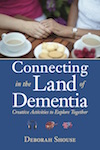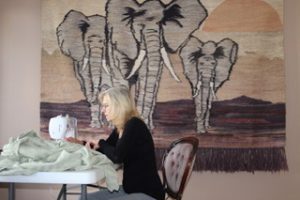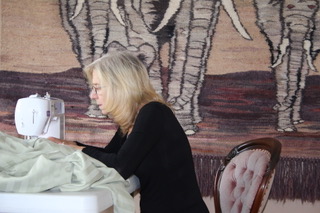Posts Tagged ‘Laurie Scherrer’
What They Don’t tell You About Dementia: A Guest Post by Laurie Scherrer
Laurie Scherrer is a light in the universe. I met her on the radio, when she co-hosted the ground-breaking program Alzheimer’s Speaks, with Lori La Bey. I was instantly inspired by Laurie’s warmth, honesty, humor, and insights. Each time I talk to her, I have fun and I learn from her. Recently, I asked her, “How can I support you in the wonderful advocacy work you are doing?” Laurie answered, “You can repost this blog, What They Don’t Tell You about Dementia.”
Laurie’s post is not just inspiring: it could be life-changing for someone who is newly diagnosed with dementia. After reading it, you’ll want to subscribe to Laurie’s blog.
What They Don’t tell You About Dementia: by Laurie Scherrer, DementiaDaze.com
When I was diagnosed with dementia (Early On-Set Alzheimer’s and Frontotemporal Degeneration) the doctors told me and my husband:
- My working days were over
- I needed to “Get my affairs in order and see an attorney”
- The time would come when I wouldn’t recognize my loved ones
- For any additional information we should go to the Alzheimer’s Association Website
- I may experience “sun-downing” in the late afternoons
- Come back in six months to see how rapidly you have progressed
 What the doctors SHOULD have told us:
What the doctors SHOULD have told us:
- There are many things that can aggravate or enhance the confusion and agitation that comes with dementia. With observation and patience, you may be able to recognize what triggers these symptoms. For example noise, stress, over-stimulation or lack of sleep. These triggers are not the same for everyone.
- Once you recognize the triggers you may be able to find ways to lessen their impact. For example, use earplugs when in a store or restaurant to reduce the noise, keep gatherings small to avoid over-stimulation, and when needed take an afternoon nap.
- The more independence you give up and allow other people to take care of – the more dependent you will become on others. Change your thought process from “I can’t do this anymore” to “How can I accomplish this task (what changes or modifications can we make to assist me).”
- On days when you are using a lot of cognitive reserve your symptoms may be strong (usually in the afternoon). This is your brain saying it is tired and needs a break. Try listening to some music or taking a nap.
- It is OK to take some time to grieve for your losses and accept that life will change. Most people need to experience this after diagnosis and again as their abilities change. In addition to grief, you may experience shock, anger, denial and sadness. These are normal reactions that can help you come to terms with your disease and hopefully help you to move on.
- Get involved with others with dementia as much as possible. There are a number of groups that offer video chats with other people living with dementia so you can socialize, ask questions and encourage each other. dementiamentors.org offers a mentor program so you can have weekly chats with someone living with dementia.
- Stay active and socialize with old friends and new. Once you curl up into yourself it is hard to get out. Enjoy life, friends, family and activities for as long as you can.
- Build your passion to fight back! Sometimes it is the passion within us that drives us to continue fighting. Get involved in advocacy work to educate about dementia. Contact Dementia Action Alliance at daanow.org to get started.
- You will have good moments when you feel “normal” and think you should go back to work and you will have bad moments when the world is a fog (dementia daze zone). You may feel confused and disoriented and find it difficult to think. There will be times when nothing seems to make sense and you can’t remember how to do things and then the fog will go away (at least for awhile). It’s OK to admit you are having a bad day.
- Dementia is more than memory loss. You may experience problems with your balance, lights flickering in your eyes, hallucinations, develop fears, or smell things that aren’t really there. Don’t be frightened, keep track of any changes or strange feelings to see how often they occur
- Dementia can progress fast, but in most cases it is a long slow progression. You may want to keep your affairs in order, but by implementing changes and strategies you will be able to overcome many obstacles and live a beneficial and happy life for some time.
Since I’m sure your doctor said about the same thing as mine, I hope you find this helpful. Now go enjoy life – Live, Love and figure out how to make adjustments to over come your obstacles.
My motto is: I don’t want just to survive – – I want to live and thrive!

Love & Laughter,
Laurie


Insider Dementia Friendly Travel Tips, from Laurie Scherrer
This year, Laurie Scherrer is taking a number of trips: Atlanta, to speak at a conference, South Carolina, for a family reunion, and the Caribbean, as a speaker and participant in a dementia-friendly cruise. Since she is living with early onset dementia, Laurie plans out her trips, taking into consideration her needs and the chaos that can be a natural part of any journey. Here are some insider dementia friendly travel tips from Laurie.
Planning for a Smooth Flight
Laurie contacts TSA and her airline, notifying them of her disability, so they can mark it on her ticket. She and her husband both paid for a TSA pass, so they can go in together. That helps her avoid the bombarding noise, distraction, and exhausting wait inherent in a long check-in line
“The TSA staff will walk you through the line,” she says.
Laurie is sensitive to noises, so the constant airport announcements, the din of hundreds of conversations, and the drone of background sounds present challenges.
“I walk into a restaurant and I hear the clanging of the dishes, the forks on the plates, the waiter’s shoes thudding against the floor,” she says. “I have lost my ability to filter sound, and those noises are as strong as any conversation I’m having.”
To minimize distraction and confusion and to help her concentrate, Laurie often wears noise-cancelling headsets.
Once in the airport, she tries to find a quiet place to sit.
“I don’t sit at the gate for two hours with a slew of people,” she says. “Sometimes a restaurant or bar is quiet. For overseas trips, you can try to get access to an airport lounge.”
She tries to get a seat towards the front of the plane, to avoid additional waiting and wading through a crush of passengers.
Packing it Up
Two weeks before a trip, Laurie organizes her clothes for each day. She puts on an outfit, then takes a picture of it.
“On the picture I write, ‘Purple shirt, black slacks, white sneakers, white socks, etc.,’” she says. “Then when I pack, I put each day’s entire outfit together, including socks and underwear. That makes getting dressed so much easier.”
Getting Oriented
At any new hotel, Laurie and her husband walk around the entire building so Laurie can get oriented. When she is traveling alone, she talks to the hotel manager, to explain her situation. At one lodge, the receptionist escorted Laurie to her room and helped her unpack. Laurie carries a tag with her name and room number on it, in case of sudden confusion.
“Don’t be afraid to ask for help,” she says.
Taking Breaks
Laurie has already planned her quiet time and her personal getaways for the upcoming cruise, where she is both a traveler and a speaker/educator.
“On cruise ships, the library is often a quiet haven,” she says.
She also avoids group shore excursions, as it is hard for her to enjoy being in a crowd.
But it’s not hard for Laurie to relish travel and to revel in engaging in new experiences and meeting new people. It just takes a little planning and a lot of taking care of herself. #
To learn more about Laurie, visit https://dementiadaze.com/about-me/


Adapting to Dementia: Laurie Scherrer’s Inspiring Story
“I’m having a slow day,” Laurie Scherrer says, when I call her Pennsylvania home for our scheduled conversation on adapting to dementia. “So bear with me.”
It was easy to bear with Laurie, as she is bright, positive, articulate, insightful, and authentic.
I met her during a telephone interview for the esteemed podcast, Alzheimer’s Speaks, which she co-hosted along with founder Lori La Bey. I was so impressed with both of the women’s insights and interviewing abilities, and I wanted to learn more about how Laurie managed her life with early onset dementia. Here are some highlights from our conversation.
From Sales Leader to Closet Cleaner
How do you go from excelling in a distinguished business career as a top manager and sales leader to becoming an unemployed 55-year-old woman who can no longer do a simple math problem or weed her prized garden?
That’s what happened when Laurie Scherrer was diagnosed with early onset dementia in 2013. After days of languishing at home, cleaning out closets, and feeling like a complete nobody, she realized she needed to take action. And being a woman filled with determination and creativity, she did just that, with her husband offering his unwavering support.
“I have a passion for excellence and the recognition that comes with it,” Laurie says. “Being Number One in sales drove me.”
Since she had nothing to push towards, she turned toward writing blogs and to her former passion for sewing, so she’d once again feel accomplished. Plus, Laurie wanted something tangible to give to her family members, something that said, “I love you.”
Forgetting the Curves and Going Straight
In her earlier days, before her career consumed much of her time, Laurie was an accomplished seamstress, reveling in creating costumes for church programs. She had loved sewing quilts and clothes and decided she’d return to her former hobby.
She sat down with yards of fabric, ready to cut quilting squares. But hard as she tried, she could not figure out how to cut the fabric. She was slumped over her sewing machine, weeping, when her neighbor dropped by.
“I can’t do this anymore,” Laurie said.
“I’ll help you,” her neighbor said.
She brought over a cutting board with lines in it and talked Laurie through the process of cutting the cloth.
“Once she helped me lay it out, I could do it again,” Laurie says. 
Laurie has since created blankets, pillowcases, burping cloths, and more for her family.
“The straight lines are working for me,” she says.
Noticing the Blessings
Laurie is making the most of her life. She treasures her glorious back yard and her deepened relationship with nature.
“Before, I was so busy, I never saw all the beauty around me,” she says.
She also treasures her worldwide friendships with people living with dementia, which she nourishes through video chatting and posting on Facebook. She and some chat friends recently started a virtual spiritual dementia café, where they read, discuss scripture and pray with and for people from all over the world.
Most of all she loves knowing she is giving back and helping others through her writing, speaking, radio hosting, and advocacy.
Teaming Up to Produce Great Results
Laurie and her husband work together to help her live a vibrant life. Here are their tips:
- Have a designated place and time to escape to, with no phones or email, so you can talk, cry, and really express yourself.
- Talk through the tough times. Notice when someone has a difficult day and figure out how you can improve things.
- Work together to adapt beloved activities.

- Laugh as much as possible.
- Be thankful for every good moment.
I know you’re going to want to know more about this remarkable woman and her tips for adapting to dementia. Visit https://dementiadaze.com/about-me/
Deborah Shouse is the author of Connecting in the Land of Dementia: Creative Activities to Explore Together and Love in the Land of Dementia: Finding Hope in the Caregiver’s Journey.




